- Home
- Peter S. Beagle
Lila The Werewolf
Lila The Werewolf Read online
Lila The Werewolf
Peter S Beagle
The author of A. Fine and Private Place and The Last Unicorn, a pair of the very best fantasy novels of our time, Peter S. Beagle has written only two fantasy short stories of which "Lila the Werewolf" is the best, a contemporary classic. Beagle is a musician, a script writer, and a literary descendant of the fantasist Robert Nathan. Like Avram Davidson, he is an urban fantasist of wit and perception; a lover of animals who knows their personalities; a writer with a flair for characterization that raises him to the very top rank of contemporary writers who choose the fantastic as their metier. And his New York setting vibrates with authenticity, though it has been twenty years since dogs have been so common in the city. This is not a story about love.
LILA THE WEREWOLF
Peter S. Beagle
Lila Braun had been living with Farrell for three weeks before he found out she was a werewolf. They had met at a party when the moon was a few nights past the full, and by the time it had withered to the shape of a lemon Lila had moved her suitcase, her guitar, and her Ewan MacColl records two blocks north and four blocks west to Farrell's apartment on Ninety-eighth Street. Girls sometimes happened to Farrell like that.
One evening Lila wasn't in when Farrell came home from work at the bookstore. She had left a note on the table, under a can of tunafish. The note said that she had gone up to the Bronx to have dinner with her mother, and would probably be spending the night there. The coleslaw in the refrigerator should be finished up before it went bad.
Farrell ate the tunafish and gave the coleslaw to Grunewald. Grunewald was a half-grown Russian wolfhound, the color of sour milk. He looked like a goat, and had no outside interests except shoes. Farrell was taking care of him for a girl who was away in Europe for the summer. She sent Grunewald a tape recording of her voice every week.
Farrell went to a movie with a friend, and to the West End afterward for beer. Then he walked home alone under the full moon, which was red and yellow. He reheated the morning coffee, played a record, read through a week-old "News of the Week in Review" section of the Sunday Times, and finally took Grunewald up to the roof for the night, as he always did. The dog had been accustomed to sleep in the same bed with his mistress, and the point was not negotiable. Grunewald mooed and scrabbled and butted all the way, but Farrell pushed him out among the looming chimneys and ventilators and slammed the door. Then he came back downstairs and went to bed.
He slept very badly. Grunewald's baying woke him twice; and there was something else that brought him half out of bed, thirsty and lonely, with his sinuses full and the night swaying like a curtain as the figures of his dream scurried offstage. Grunewald seemed to have gone off the air—perhaps it was the silence that had awakened him. Whatever the reason, he never really got back to sleep.
He was lying on his back, watching a chair with his clothes on it becoming a chair again, when the wolf came in through the open window. It landed lightly in the middle of the room and stood there for a moment, breathing quickly, with its ears back. There was blood on the wolf's teeth and tongue, and blood on its chest.
Farrell, whose true gift was for acceptance, especially in the morning, accepted the idea that there was a wolf in his bedroom and lay quite still, closing his eyes as the grim, black-lipped head swung toward him. Having once worked at a zoo, he was able to recognize the beast as a Central European subspecies—smaller and lighter-boned than the northern timber wolf variety, lacking the thick, ruffy mane at the shoulders, and having a more pointed nose and ears. His own pedantry always delighted him, even at the worst moments.
Blunt claws clicking on the linoleum, then silent on the throw rug by the bed. Something warm and slow splashed down on his shoulder, but he never moved. The wild smell of the wolf was over him, and that did frighten him at last—to be in the same room with that smell and the Miro prints on the walls. Then he felt the sunlight on his eyelids, and at the same moment he heard the wolf moan softly and deeply. The sound was not repeated, but the breath on his face was suddenly sweet and smoky, dizzyingly familiar after the other. He opened his eyes and saw Lila. She was sitting naked on the edge of the bed, smiling, with her hair down.
"Hello, baby," she said. "Move over, baby. I came home."
Farrell's gift was for acceptance. He was perfectly willing to believe that he had dreamed the wolf; to believe Lila's story of boiled chicken and bitter arguments and sleeplessness on Tremont Avenue; and to forget that her first caress had been to bite him on the shoulder; hard enough so that the blood crusting there as he got up and made breakfast might very well be his own. But then he left the coffee perking and went up to the roof to get Grunewald. He found the dog sprawled in a grove of TV antennas, looking more like a goat than ever, with his throat torn out. Farrell had never actually seen an animal with its throat torn out.
The coffeepot was still chuckling when he came back into the apartment, which struck him as very odd. You could have either werewolves or Pyrex nine-cup percolators in the world, but not both, surely. He told Lila, watching her face. She was a small girl, not really pretty, but with good eyes and a lovely mouth, and with a curious sullen gracefulness that had been the first thing to speak to Farrell at the party. When he told her how Grunewald had looked, she shivered all over, once.
"Ugh!" she said, wrinkling her lips back from her neat white teeth. "Oh baby, how awful. Poor Grunewald. Oh, poor Barbara." Barbara was Grunewald's owner.
"Yeah," Farrell said. "Poor Barbara, making her little tapes in Saint-Tropez." He could not look away from Lila's face.
She said, "Wild dogs. Not really wild, I mean, but with owners. You hear about it sometimes, how a pack of them get together and attack children and things, running through the streets. Then they go home and eat their Dog Yummies. The scary thing is that they probably live right around here. Everybody on the block seems to have a dog. God, that's scary. Poor Grunewald."
"They didn't tear him up much," Farrell said. "It must have been just for the fun of it. And the blood. I didn't know dogs killed for the blood. He didn't have any blood left."
The tip of Lila's tongue appeared between her lips, in the unknowing reflex of a fondled cat. As evidence, it wouldn't have stood up even in old Salem; but Farrell knew the truth then, beyond laziness or rationalization, and went on buttering toast for Lila. Farrell had nothing against werewolves, and he had never liked Grunewald.
He told his friend Ben Kassoy about Lila when they met in the Automat for lunch. He had to shout it over the clicking and rattling all around them, but the people sitting six inches away on either hand never looked up. New Yorkers never eavesdrop. They hear only what they simply cannot help hearing.
Ben said, "I told you about Bronx girls. You better come stay at my place for a few days."
Farrell shook his head. "No, that's silly. I mean, it's only Lila. If she were going to hurt me, she could have done it last night. Besides, it won't happen again for a month. There has to be a full moon."
His friend stared at him. "So what? What's that got to do with anything? You going to go on home as though nothing had happened?"
"Not as though nothing had happened," Farrell said lamely. "The thing is, it's still only Lila, not Lon Chaney or somebody. Look, she goes to her psychiatrist three afternoons a week, and she's got her guitar lesson one night a week, and her pottery class one night, and she cooks eggplant maybe twice a week. She calls her mother every Friday night, and one night a month she turns into a wolf. You see what I'm getting at? It's still Lila, whatever she does, and I just can't get terribly shook about it. A little bit, sure, because what the hell. But I don't know. Anyway, there's no mad rush about it. I'll talk to her when the thing comes up in the conversation, just natur
ally. It's okay."
Ben said, "God damn. You see why nobody has any respect for liberals anymore? Farrell, I know you. You're just scared of hurting her feelings."
"Well, it's that too," Farrell agreed, a little embarrassed. "I hate confrontations. If I break up with her now, she'll think I'm doing it because she's a werewolf. It's awkward, it feels nasty and middle-class. I should have broken up with her the first time I met her mother, or the second time she served the eggplant. Her mother, boy, there's the real werewolf, there's somebody I'd wear wolfbane against, that woman. Damn, I wish I hadn't found out. I don't think I've ever found out anything about people that I was the better for knowing."
Ben walked all the way back to the bookstore with him, arguing. It touched Farrell, because Ben hated to walk. Before they parted, Ben suggested, "At least you could try some of that stuff you were talking about, the wolfbane. There's garlic, too—you put some in a little bag and wear it around your neck. Don't laugh, man. If there's such a thing as werewolves, the other stuff must be real too. Cold iron, silver, oak, running water—"
"I'm not laughing at you," Farrell said, but he was still grinning. "Lila's shrink says she has a rejection thing, very deep-seated, take us years to break through all that scar tissue. Now if I start walking around wearing amulets and mumbling in Latin every time she looks at me, who knows how far it'll set her back? Listen, I've done some things I'm not proud of, but I don't want to mess up anyone's analysis. That's the sin against God." He sighed and slapped Ben lightly on the arm. "Don't worry about it. We'll work it out, I'll talk to her."
But between that night and the next full moon, he found no good, casual way of bringing the subject up. Admittedly, he did not try as hard as he might have: it was true that he feared confrontations more than he feared werewolves, and he would have found it almost as difficult to talk to Lila about her guitar playing, or her pots, or the political arguments she got into at parties. "The thing is," he said to Ben, "it's son of one more little weakness not to take advantage of. In a way."
They made love often that month. The smell of Lila flowered in the bedroom, where the smell of the wolf still lingered almost visibly, and both of them were wild, heavy zoo smells, warm and raw and fearful, the sweeter for being savage. Farrell held Lila in his arms and knew what she was, and he was always frightened; but he would not have let her go if she had turned into a wolf again as he held her. It was a relief to peer at her while she slept and see how stubby and childish her fingernails were, or that the skin around her mouth was rashy because she had been snacking on chocolate. She loved secret sweets, but they always betrayed her.
It's only Lila after all, he would think as he drowsed off. Her mother used to hide the candy, but Lila always found it. Now she's a big girl, neither married nor in a graduate school, but living in sin with an Irish musician, and she can have all the candy she wants.
What kind of a werewolf is that. Poor Lila, practicing Who killed Davey Moore? Why did he die? , . .
The note said that she would be working late at the magazine, on layout, and might have to be there all night. Farrell put on about four feet of Telemann laced with Django Reinhardt, took down The Golden Bough, and settled into a chair by the window. The moon shone in at him, bright and thin and sharp as the lid of a tin can, and it did not seem to move at all as he dozed and woke.
Lila's mother called several times during the night, which was interesting. Lila still picked up her mail and most messages at her old apartment, and her two roommates covered for her when necessary, but Farrell was absolutely certain that her mother knew she was living with him. Farrell was an expert on mothers. Mrs. Braun called him Joe each time she called and that made him wonder, for he knew she hated him. Does she suspect that we share a secret? Ah, poor Lila.
The last time the telephone woke him, it was still dark in the room, but the traffic lights no longer glittered through rings of mist, and the cars made a different sound on the warming pavement A man was saying clearly in the street, "Well, I'd shoot'm. I'd shoot'm." Farrell let the telephone ring ten times before he picked it up.
"Let me talk to Lila," Mrs. Braun said.
"She isn't here." What if the sun catches her, what if she turns back to herself in front of a cop, or a bus driver, or a couple of nuns going to early Mass? "Lila isn't here, Mrs. Braun."
"I have reason to believe that's not true." The fretful, muscular voice had dropped all pretense of warmth. "I want to talk to Lila."
Farrell was suddenly dry-mouthed and shivering with fury. It was her choice of words that did it. "Well, I have reason to believe you're a suffocating old bitch and a bourgeois Stalinist. How do you like them apples, Mrs. B?" As though his anger had summoned her, the wolf was standing two feet away from him. Her coat was dark and lank with sweat, and yellow saliva was mixed with the blood that strung from her jaws. She looked at Farrell and growled far away in her throat.
"Just a minute," he said. He covered the receiver with his palm. "It's for you," he said to the wolf. "It's your mother."
The wolf made a pitiful sound, almost inaudible, and scuffed at the floor. She was plainly exhausted. Mrs. Braun pinged in Farrell's ear like a bug against a lighted window. "What, what? Hello, what is this? Listen, you put Lila on the phone right now. Hello? I want to talk to Lila. I know she's there."
Farrell hung up just as the sun touched a corner of the window. The wolf became Lila. As before, she only made one sound. The phone rang again, and she picked it up without a glance at Farrell. "Bernice?" Lila always called her mother by her first name. "Yes—no, no—yeah, I'm fine. I'm all right, I just forgot to call. No, I'm all right, will you listen? Bernice, there's no law that says you have to get hysterical. Yes, you are." She dropped down on the bed, groping under her pillow for cigarettes. Farrell got up and began to make coffee.
"Well, there was a little trouble," Lila was saying. "See, I went to the zoo, because I couldn't find—Bernice, I know, I know, but that was, what, three months ago. The thing is, I didn't think that they'd have their horns so soon. Bernice, I had to, that's all. There'd only been a couple of cats and a—well, sure they chased me, but I—well, Momma, Bernice, what did you want me to do? Just what did you want me to do? You're always so dramatic—why do I shout? I shout because I can't get you to listen to me any other way. You remember what Dr. Schechtman said—what? No, I told you, I just forgot to call. No, that is the reason, that's the real and only reason. Well, whose fault is that? What? Oh, Bernice. Jesus Christ, Bernice. All right, how is it Dad's fault?"
She didn't want the coffee, or any breakfast, but she sat at the table in his bathrobe and drank milk greedily. It was the first time he had ever seen her drink milk. Her face was sandy pale, and her eyes were red. Talking to her mother left her looking as though she had actually gone ten rounds with the woman. Farrell asked, "How long has it been happening?"
"Nine years," Lila said. "Since I hit puberty. First day, cramps; the second day, this. My introduction to womanhood." She snickered and spilled her milk. "I want some more," she said. "Got to get rid of that taste."
"Who knows about it?" he asked. "Pat and Janet?" They were the two girls she had been rooming with.
"God, no. I'd never tell them. I've never told a girl. Bernice knows, of course, and Dr. Schechtman—he's my head doctor. And you now. That's all." Farrell waited. She was a bad liar, and only did it to heighten the effect of the truth. "Well, there was Mickey," she said. "The guy I told you about the first night, you remember? It doesn't matter. He's an acidhead in Vancouver, of all the places. He'll never tell anybody."
He thought: I wonder if any girl has ever talked about me in that sort of voice. I doubt it, offhand. Lila said, "It wasn't too hard to keep it secret. I missed a lot of things. Like I never could go to the riding camp, and I still want to. And the senior play, when I was in high school. They picked me to play the girl in Liliom, but then they changed the evening, and I had to say I was sick. And the winter's bad, because the sun sets so
early. But actually, it's been a lot less trouble than my goddamn allergies." She made a laugh, but Farrell did not respond.
"Dr. Schechtman says it's a sex thing," she offered. "He says it'll take years and years to cure it. Bernice thinks I should go to someone else, but I don't want to be one of those women who runs around changing shrinks like hair colors. Pat went through five of them in a month one time. Joe, I wish you'd say something. Or just go away."
"Is it only dogs?" he asked. Lila's face did not change, but her chair rattled, and the milk went over again. Farrell said, "Answer me. Do you only kill dogs, and cats, and zoo animals?"
The tears began to come, heavy and slow, bright as knives in the morning sunlight. She could not look at him, and when she tried to speak she could only make creaking, cartilaginous sounds in her throat. "You don't know," she whispered at last. "You don't have any idea what it's like."
"That's true," he answered. He was always very fair about that particular point.
He took her hand, and then she really began to cry. Her sobs were horrible to hear, much more frightening to Farrell than any wolf noises. When he held her, she rolled in his arms like a stranded ship with the waves slamming into her. I always get the criers, he thought sadly. My girls always cry, sooner or later. But never for me.
"Don't leave me!" she wept. "I don't know why I came to live with you—I knew it wouldn't work—but don't leave me! There's just Bernice and Dr. Schechtman, and it's so lonely. I want somebody else, I get so lonely. Don't leave me, Joe. I love you, Joe. I love you."
She was patting his face as though she were blind. Farrell stroked her hair and kneaded the back of her neck, wishing that her mother would call again. He felt skilled and weary, and without desire. I'm doing it again, he thought.
"I love you," Lila said. And he answered her, thinking, I'm doing it again. That's the great advantage of making the same mistake a lot of times. You come to know it, and you can study it and get inside it, really make it yours. It's the same good old mistake, except this time the girl's hang-up is different. But it's the same thing. I'm doing it again.

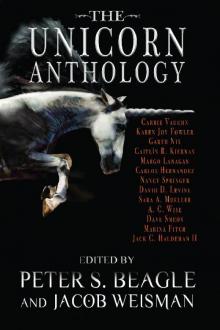 The Unicorn Anthology.indb
The Unicorn Anthology.indb Sleight of Hand
Sleight of Hand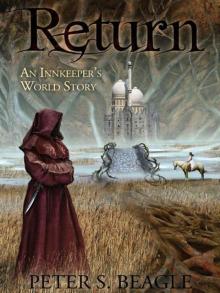 Return
Return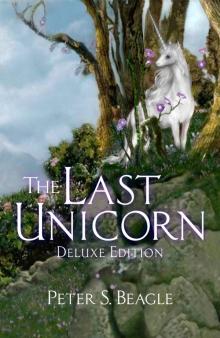 The Last Unicorn
The Last Unicorn Two Hearts
Two Hearts Mirror Kingdoms: The Best of Peter S. Beagle
Mirror Kingdoms: The Best of Peter S. Beagle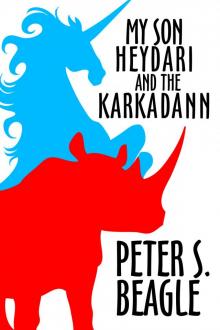 My Son Heydari and the Karkadann
My Son Heydari and the Karkadann The Magician of Karakosk, and Other Stories
The Magician of Karakosk, and Other Stories The Urban Fantasy Anthology
The Urban Fantasy Anthology The Story of Kao Yu
The Story of Kao Yu The Karkadann Triangle
The Karkadann Triangle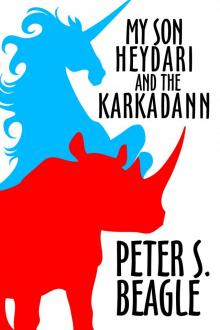 My Son and the Karkadann
My Son and the Karkadann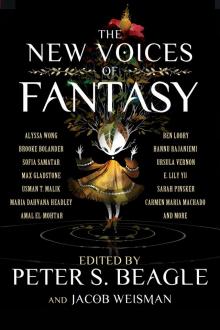 The New Voices of Fantasy
The New Voices of Fantasy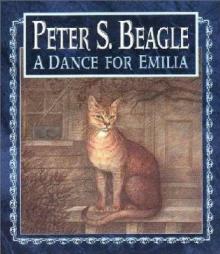 A Dance for Emilia
A Dance for Emilia We Never Talk About My Brother
We Never Talk About My Brother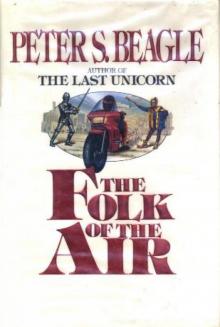 The Folk Of The Air
The Folk Of The Air The Magician of Karakosk: Tales from the Innkeeper's World
The Magician of Karakosk: Tales from the Innkeeper's World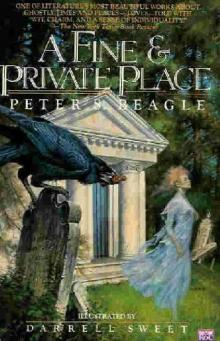 A Fine and Private Place
A Fine and Private Place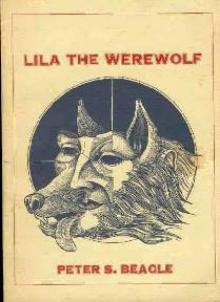 Lila The Werewolf
Lila The Werewolf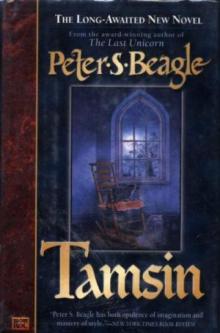 Tamsin
Tamsin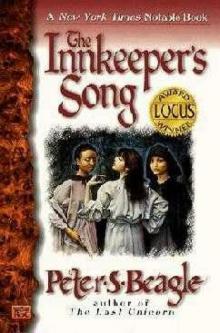 Innkeeper's Song
Innkeeper's Song